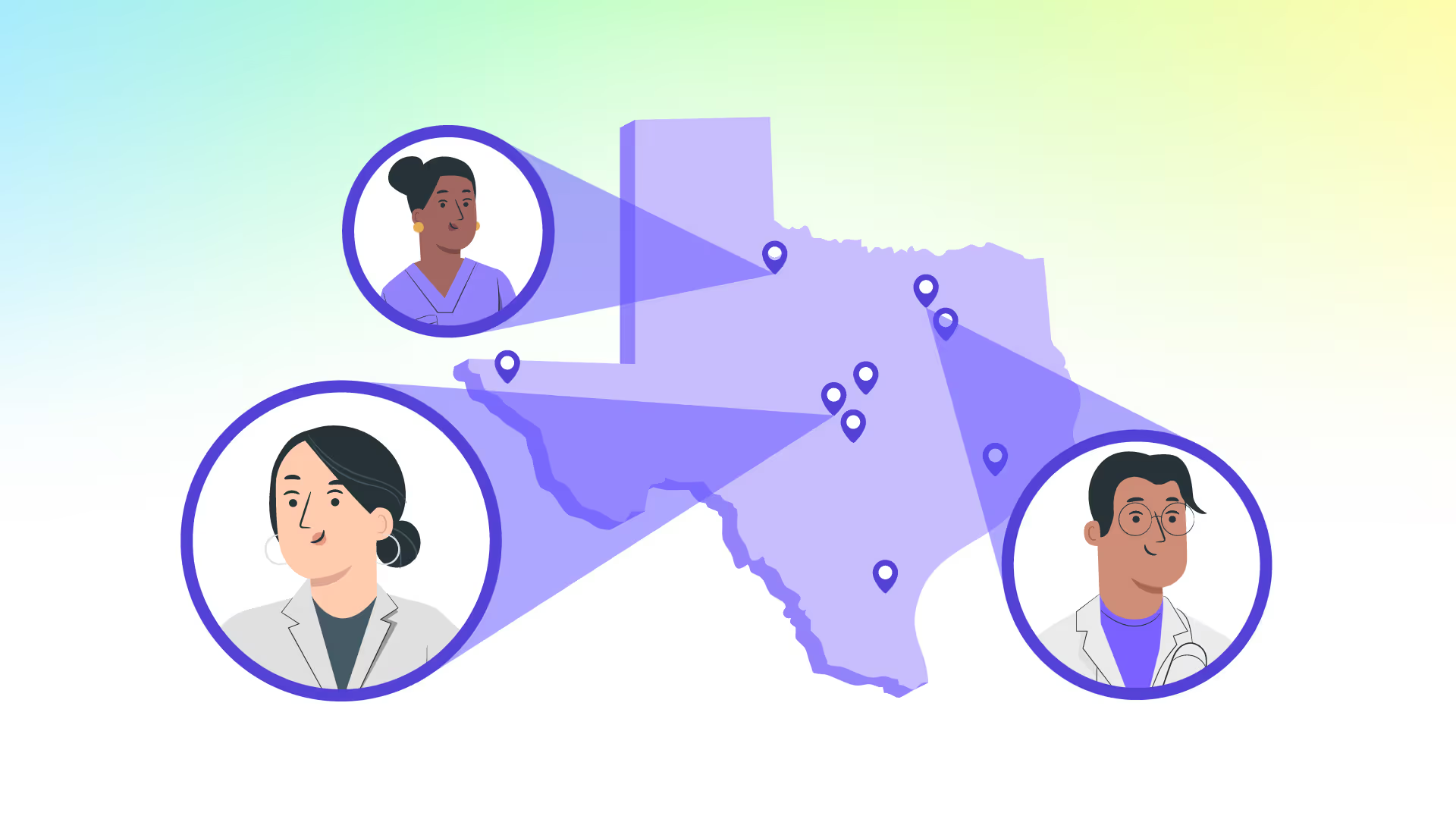If you’re an NP student gearing up for clinicals, or just considering a future in geriatric care, you’ve probably heard that finding a preceptor in geriatrics can be one of the toughest parts of the process.
Between limited availability, busy clinics, and unclear expectations, it’s easy to feel stuck before you even start.
This guide is here to help. We’ll walk you through exactly what Geriatric Nurse Practitioners do, the settings they work in, what the job market looks like in 2025, and how much you can expect to earn in this growing field.
Most importantly, we’ll dive into real-world strategies to help you secure a geriatrics preceptor, whether you’re going the DIY route or using a paid service. This includes understanding the importance of campus visits and the diverse care settings where you might work.
Whether you’re just starting out or deep into your clinical search, consider this your go-to resource for navigating the world of geriatrics NP rotations—with less guesswork, and more clarity.
What Do Geriatrics Nurse Practitioners Do? Focus on Health Promotion
Geriatrics Nurse Practitioners (also known as Adult-Gerontology Nurse Practitioners, or AGNPs) are essential players in the care of aging adults.
Their role goes far beyond managing blood pressure or refilling prescriptions, they specialize in navigating the complex, interconnected health challenges that often come with aging, including both acute and chronic conditions.
The care nurse practitioner program is designed to equip these NPs with the skills needed to handle comprehensive patient care, including health promotion, common acute illnesses, and chronic disease management. Additionally, the curriculum emphasizes disease prevention and evidence-based practice to ensure high-quality care.
This includes addressing the comprehensive care needs of individuals from late adolescence through older adulthood, often in collaboration with physicians.
These NPs are trained to address conditions like dementia, fall risk, chronic pain, medication overload, and more.
Their focus isn’t just on treating disease, it’s on helping older adults maintain independence, dignity, and quality of life for as long as possible. Graduates of these programs are well-prepared to provide comprehensive primary care services, showcasing positive outcomes in various healthcare settings. This includes addressing the full spectrum of health needs from late adolescence through older adulthood.
That often includes everything from mobility aids to mental health support, and even navigating end-of-life conversations with compassion and clarity.
At the core, the role of evidence-based practice in modern health care is essential for providing holistic care to patients across the adult age spectrum. The role of the primary care nurse practitioner, especially the Adult-Gerontology Primary Care Nurse Practitioner, is essential in providing holistic care to patients across the adult age spectrum, including long term care settings and occupational health environments.
Where Do Geriatrics Nurse Practitioners Work?
Geriatrics Nurse Practitioners (GNPs) are needed in a wide range of healthcare environments, including various care settings and long term care settings, each offering different scopes of practice, patient interactions, and care delivery models.
They are also trained to manage a broad spectrum of primary care services, addressing health and wellness needs across different age groups and clinical settings. Here’s where you’ll most commonly find them making an impact:
A dedicated clinical placement team collaborates with students and faculty to design comprehensive clinical practicums, ensuring diverse training opportunities in various healthcare settings.
Skilled Nursing Facilities (SNFs) & Long-Term Care Centers
- GNPs manage residents with complex, chronic conditions like diabetes, heart failure, and dementia.
- These roles require strong assessment skills, an understanding of polypharmacy, and expertise in care coordination.
- Facilities often rely on GNPs to reduce hospital readmissions, manage acute changes in condition, and support end-of-life care planning.
Assisted Living Communities & Memory Care Units
- GNPs focus on maintaining independence, preventing illness, and managing early-stage cognitive and physical decline.
- They collaborate with staff and family members to support residents’ health goals and safety.
- In memory care, their role often involves behavioral management strategies and caregiver education around dementia care.
Hospitals (Geriatric Consult Teams & Transitional Care Units)
- In hospital settings, GNPs are involved in evaluating older patients for geriatric syndromes, discharge planning, and medication reconciliation.
- Transitional care units rely on GNPs to ease the shift from hospital to home or a long-term care facility, reducing the risk of complications.
- Their consultative role ensures elderly patients receive age-appropriate, coordinated inpatient care.
Outpatient Geriatric Primary Care & Specialty Clinics
- GNPs in outpatient clinics manage chronic illnesses, perform health screenings, and develop long-term wellness plans.
- These clinics often serve as medical homes for elderly patients who prefer aging in place with consistent provider continuity.
Home Health Services
- GNPs provide in-home assessments, manage medications, and treat acute issues to help avoid unnecessary hospitalizations.
- Ideal for patients with limited mobility or multiple chronic conditions who need care brought to them.
What Geriatrics NP Offices Actually Look For
If your goal is to land a preceptor in a geriatrics NP office, it helps to think like the people reviewing your request. These clinics are often short on time and high on responsibility—so when they agree to precept a student, they’re looking for someone who will add value, not extra work.
Here’s what geriatrics NP offices tend to prioritize when choosing students for preceptorships:
Strong Communication & Empathy
- Older adult patients often deal with multiple conditions, cognitive decline, or emotional vulnerability.
- GNPs need to build trust quickly—so students must demonstrate maturity, patience, and compassion from day one.
Relevant Experience
- Any background in adult or geriatric care, even at the RN level, gives you a leg up.
- Mentioning work in SNFs, assisted living, or home health shows you’re not a stranger to the pace and complexity of elder care.
A Flexible, Team-First Attitude
- Most geriatrics offices operate with multidisciplinary teams—MDs, PTs, social workers, dietitians.
- Students who show they can collaborate, adapt, and pitch in where needed tend to be remembered (and recommended).
Willingness to Learn Without Ego
- It’s okay not to know everything—it’s not okay to pretend you do.
- Geriatrics preceptors appreciate students who ask thoughtful questions, seek feedback, and own their growth process.
Professionalism & Preparedness
- This means being on time, responsive to communication, respectful of boundaries, and clear about your school’s requirements.
- Coming prepared with paperwork, malpractice info, and a clear ask shows you’re serious—and makes it easier for them to say yes.
In a saturated preceptor market, students who stand out are those who make the experience better for the office, not harder. Showing that graduates are prepared, teachable, and genuinely interested in geriatrics can make the difference between an ignored email and a confirmed rotation.
Additionally, certification is a crucial aspect of your training. Highlighting your path towards AGPCNP credentials and the clinical experiences that support this can reassure preceptors of your commitment and readiness.
Clinical sites across Ohio provide essential environments where students gain practical experience in various healthcare settings. These sites facilitate interactions with different healthcare professionals, contributing significantly to the students’ clinical training and certification requirements.
Geriatrics NP offices look for students who are ready to assume an advanced practice role and can diagnose a range of conditions. They value students who understand disease prevention and evidence-based practice as part of their comprehensive care approach.
These offices prioritize healthcare professionals who are well-prepared graduates, ready to deliver primary care services as advanced practice registered nurses. They seek students who have learned essential skills through their curriculum and clinical training.
How to search for preceptors in Geriatrics NP Offices?
If you’re trying to land a geriatrics preceptor, here’s the truth: the “spray and pray” email method won’t cut it. The key is being intentional and approaching it like a mini job hunt, not a desperate last-minute scramble.
Emphasize your commitment to advanced practice and how it prepares you for comprehensive roles in patient care across campus and various care settings.
Highlight your ability to deliver holistic, evidence-based care to a diverse patient population, including adolescents and adults, across various healthcare settings. Evidence-based practice is crucial in modern health care, equipping professionals to implement guidelines and adapt interventions based on individual assessments.
Here’s how to make your search actually work:
Step 1: Start Really Early
Aim to begin your search 3–6 months ahead of your rotation to ensure you are prepared to take on the challenges of your clinical experiences and to prepare graduates for advanced practice roles. Geriatric NP sites fill up fast, and the early birds avoid the last-minute panic (and preceptor drought).
Step 2: Write a Clear, Compelling Ask
Students learn to skip the generic email by introducing themselves, sharing their program details, rotation dates, and explaining why they’re genuinely interested in geriatrics. Keep it short, direct, and professional—with a personal touch that shows effort.
Step 3: Attach All Required Documents Up Front
Include your resume, proof of malpractice insurance, and any school paperwork in your initial email. As a registered nurse, be sure to also include any certification documents from a recognized credentialing center. Preceptors don’t have time to chase you down for missing forms—make their decision easy.
Step 4: Follow Up Without Being Pushy
If you haven’t heard back in 7–10 days, send a brief, polite follow-up. Keep it warm and respectful—sometimes your message just got buried. Advanced practice nursing professionals understand the importance of persistence, professionalism, and evidence based practice in clinical settings. After two follow-ups, move on and keep searching.
Step 5: Think Beyond Traditional Clinics
Explore alternative geriatrics care settings like telehealth, home health, hospice, or memory care programs. These often offer excellent learning experiences—and fewer students are applying to them. Additionally, consider clinical sites across Ohio, where you can gain practical experience and interact with various healthcare professionals, significantly contributing to your clinical training and certification requirements.
Research potential preceptors thoroughly, focusing on those involved in educational and legislative activities aimed at enhancing quality healthcare. Emphasize how your education prepares graduates and how students learn essential skills through both classroom and clinical training.
Burned Out on Searching? Fast-Track Your Preceptor Search
There comes a point in every NP student’s journey when the cold emails, dead-end leads, and awkward follow-ups just aren’t cutting it anymore. If you’ve hit that wall—welcome to the next level.
Paid preceptor services are built for students who are done wasting time on “maybe” replies and ghosted emails. Companies like NPHub exist specifically to take the load off your shoulders and make sure you actually secure a preceptor—without sacrificing your sanity (or your timeline).
They connect NP students with vetted, pre-approved preceptors who are already open to taking students, ensuring that students learn essential skills in primary care and clinical reasoning.
You’re matched based on specialty, schedule, location, and even remote options if applicable, ensuring you gain valuable clinical experience tailored to your certification needs.
They handle the logistics—contracts, paperwork, onboarding—so you can focus on being a great student, not a full-time email chaser.
Your Shortcut to a Stress-Free Preceptor Match Starts Here
If you’re over the endless emails, unanswered calls, and wasted time trying to find your own preceptor—you’re not alone. And you don’t have to do this the hard way.
NPHub makes the process faster, easier, and way less stressful by matching you with a qualified preceptor (including specialties like acute care and geriatrics) who’s ready to teach—no guesswork required. They handle the paperwork, coordinate the logistics, and get you placed so you can focus on what actually matters: learning, growing, and graduating on time.
Thousands of NP students have already chosen NPHub, and here’s why it works:
- Fast Matching: Placement options often come within days, not months.
- Verified Preceptors: Every preceptor is licensed, vetted, and reviewed for quality.
- Full Admin Support: NPHub handles contracts, forms, follow-ups, and all the fine print.
- Specialty Access: From geriatrics to acute care and everything in between, they cover the hard-to-find areas.
- Payment Plans: Flexible options make it accessible even if you’re budgeting tight.
At the end of the day, you’re not just paying for a placement—you’re investing in getting your degree done without unnecessary delays or stress. For many students, that’s more than worth it, ensuring they are well prepared for their future careers by emphasizing evidence based practice.
By joining NPHub, you’re also tapping into a nationwide NP community—packed with tips, support, and job opportunities that go beyond clinicals.
Bottom line? You’ve got options. Let’s make your path to practice smoother, smarter, and a lot less chaotic with our online platform designed to prepare graduates for advanced practice roles in various healthcare settings.
Find a preceptor who cares with NPHub
Book a rotation.webp)








.webp)


.webp)



%20(3)%20(2).svg)
.webp)